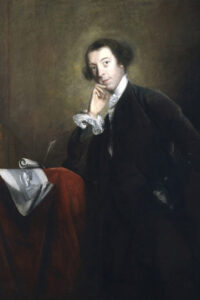
The Castle of Otranto
The Castle of Otranto tells the story of Manfred, lord of the castle, and his family. The book begins on the wedding day of his sickly son Conrad and Princess Isabella. Shortly before the wedding, however, Conrad is crushed to death by a gigantic helmet that falls on him from above. This inexplicable event is particularly ominous in light of an ancient prophecy “that the castle and lordship of Otranto should pass from the present family, whenever the real owner should be grown too large to inhabit it.” Manfred, terrified that Conrad’s death signals the beginning of the end for his line, resolves to avert destruction by marrying Isabella himself while divorcing his current wife, Hippolita, who he feels has failed to bear him a proper heir in light of the sickly condition of Conrad before his untimely death. However, as Manfred attempts to marry Isabella, she escapes to a church with the aid of a peasant named Theodore.
Manfred orders Theodore’s death while talking to the friar Jerome, who ensures Isabella’s safety at the church. When Theodore removes his shirt to be killed, Jerome recognizes a marking below his shoulder and identifies Theodore as his son. Jerome begs for his son’s life, but Manfred says Jerome must either give up the princess or his son’s life. They are interrupted by a trumpet and the entrance of knights from another kingdom, who want to deliver Isabella to her father, Frederic, along with the castle, as Frederic has a stronger claim to it (another reason Manfred wishes to wed Isabella). This leads the knights and Manfred to race to find Isabella. Theodore, having been locked in a tower by Manfred, is freed by Manfred’s daughter, Matilda. He runs to the underground church and finds Isabella. He hides her in a cave, blocks it to protect her from Manfred, and fights one of the mysterious knights. Theodore badly injures the knight, who turns out to be Isabella’s father, Frederic. With that, they all go to the castle to work things out. Frederic falls in love with Matilda, and he and Manfred make a deal to marry each other’s daughters. Frederic backs out after being warned by an apparition of a skeleton.
Read or download Book
Horace Walpole
Horatio Walpole, 4th Earl of Orford (24 September 1717 – 2 March 1797), better known as Horace Walpole, was an English writer, art historian, man of letters, antiquarian, and Whig politician.
Biography.
He had Strawberry Hill House built in Twickenham, southwest London, reviving the Gothic style some decades before his Victorian successors. His literary reputation rests on the first Gothic novel, The Castle of Otranto (1764), and his Letters, which are of significant social and political interest. Yale University Press has published them in 48 volumes. In 2017, a volume of Walpole’s selected letters was published. The youngest son of the first British Prime Minister, Sir Robert Walpole, 1st Earl of Orford, became the 4th and last Earl of Orford of the second creation on his nephew’s death in 1791. Walpole was born in London, the youngest son of British Prime Minister Sir Robert Walpole and his wife, Catherine. Like his father, he received early education in Bexley, partly under Edward Weston. He was also educated at Eton College and King’s College, Cambridge.
Walpole’s first friends were probably his cousins Francis and Henry Conway, to whom he became firmly attached, especially Henry. At Eton, he formed a schoolboy confederacy, the “Triumvirate,” with Charles Lyttelton (later an antiquary and bishop) and George Montagu (later a member of parliament and Private Secretary to Lord North). More critical was another group of friends dubbed the “Quadruple Alliance”: Walpole, Thomas Gray, Richard West, and Thomas Ashton. At Cambridge, Walpole was influenced by Conyers Middleton, an unorthodox theologian. Walpole accepted the sceptical nature of Middleton’s attitude to some essential Christian doctrines for the rest of his life, including a hatred of superstition and bigotry even though he was a nominal Anglican. Ceasing to reside at Cambridge at the end of 1738, Walpole left without taking a degree.






